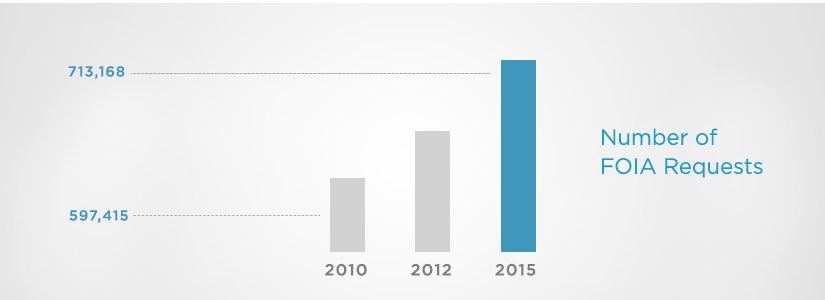How to Handle Right to Know/FOIA Requests Using Email Retrieval Software

Email retrieval can be discouraging—especially if it’s in response to something such as a media inquiry like a FOIA request or something based off the Right to Know law. As a private company or governmental agency, having to respond to a reporter’s inquiry can seem downright maddening when there are other, more urgent items on your to-do list.
Regardless of how you feel about media requests, your company is likely expending massive amounts of time and staff resources trying to stay compliant: i.e. ensuring that it can handle these requests for information, as well as stay compliant with federal regulations that require careful archiving and retrieval abilities.
Download our eBook on how to choose the best email archiving solution.
In recent years, government regulations that require more compliance efforts — and certainly careful email and data archiving — have increased to mind-boggling levels. For example, in 2012 alone — according to data reported by The Washington Post — the federal government created $216 billion in regulatory costs. These regulations, as the report explains, “put nearly 87 million hours of paperwork burdens on the economy, or the equivalent of a year’s work for some 43,000 full-time employees.”
And it hasn’t gotten better since 2012 — quite the opposite. The total regulatory costs continue to skyrocket, now to the tune of trillions per year. There are more than 5,000 regulations alone that pertain to email storage in the Federal Rules of Civil Procedure 16, 26, 33, 34, and 45.
Maintaining compliance can be particularly difficult if you aren’t equipped and prepared to deal with a variety of situations, especially:
- the right to know law (and in the examples below, it’s clear that news stations can be tenacious in holding local governments responsible for right to know requests)
- media requests
- subpoenas and legal holds
- Freedom of Information Act (FOIA)
Recent Examples of the Right to Know Law, Media Requests, and FOIA
1. Reading, Pennsylvania
On July 13, 2015, a news station based in Pennsylvanie filed a right to know request to the city of Reading. The news station received a response a few days later from government officials saying that the city was having trouble getting the needed information. As reported by WFMZ.com:
In a letter dated July 17 and received by 69 News on July 20, Frederick T. Lachat III, the city’s open records officer, said “the city is exercising its right under Section 902 of the Right-to-Know law to extension of up to 30-days to respond to your request due to staffing limitations…”
What exactly did they want from the city? They wanted to know why their city was being investigated by the FBI: “…69 News is seeking from the city solicitor’s office official copies of the federal grand jury subpoena and search warrant that FBI agents served on City Hall on July 10. Agents also searched the home of Reading Mayor Vaughn Spencer.”
69 News received confirmation from officials involved that the FBI probe is related to the city’s handling of government contracts and accusations of “pay to play” type politics. (Frankly, this city might have slightly bigger problems than slow email retrieval.)
2. Steelton, Pennsylvania
Another local news station in a small city (also in Pennsylvania, oddly enough) took the city government to task when they exposed the city’s lack of compliance with right to know law. As ABC27 reported on its website:
…law requires municipalities to post information about the statute, with instructions detailing how citizens can make open records requests on their websites. Several weeks ago, ABC27 noticed Steelton did not have that information posted. After several phone calls and stories, ABC27 reporters got the Office of Open Records involved. The Borough of Steelton has now posted the required Right to Know information on its website.
But ABC27 wasn’t finished with the city. When the city finally published its Right to Know information, the news station tried to submit a request to test the efficiency of the city’s new system:
On Monday, ABC27 tried to send a Right to Know request to the new email address listed on the site. The email bounced back. After alerting the Borough Manager, the error was fixed. ABC27 is also looking at other transparency concerns. One of Steelton’s city council members says she hasn’t seen records of meeting minutes in more than a year. The most recent minutes on the website are from 2013, and when ABC27 went to the borough office to ask for the documents, the Borough Manager said they would only be released with a Right to Know request.
3. Detroit, Michigan
Pennsylvania isn’t the only place where people are holding their local governments accountable for right to know and FOIA policy. Investigators found that Detroit City Hall was allowing its employees to conduct official business over both personal and government email channels. This alarmed open records advocates because of the capability to hide information using private communication channels.
The city of Detroit attempted to reassure the public, as WXYZ.com reported:
…the city says, all department heads and cabinet members have been strictly told, all official communication on personal channels or not, are subject to the Freedom of Information Act. “They know when you are doing city business, if we get a FOIA, you have a duty to turn it [email] over. The mayor has made that very clear,” says Alexis Wiley, chief of staff to Mayor Mike Duggan.
Advocates of FOIA, however, are troubled by the use of private email because it makes it easier to hide information and avoid FOIA compliance. Such concerns have even reached to the highest level of government.
4. FOIA at the Highest Level
FOIA controversy has, in recent years, become national headline news. Some of it is maddening and laughably ridiculous, such as when NSA told Salon.com that it does not have the technological capability to search the emails of its own employees — and this not long after it was discovered that NSA had found a way to store and comb through the emails of millions of private citizens.
Apparently, the IRS has also had some slight difficulty (to say the least) in remaining compliant with FOIA policy. A federal judge recently ordered the IRS to provide a report by June 29 about the status of the recovery and release of emails of Lois Lerner and other IRS officials in connection to the targeting of political opponents. Initially, the IRS said that the emails had been lost.
Even the Secretary of State cannot escape the requirements of FOIA law, evidenced by the ongoing saga involving Hillary Clinton, who was discovered to be using private email storage — i.e. servers maintained in her own home — to conduct official state business. BusinessInsider.com summed up the controversy:
Clinton’s emails have been the subject of a growing controversy since a New York Times article published last week revealed she exclusively used a private address on the domain “clintonemail.com” when she led the State Department from 2009 through early 2013. The Times suggested this may have been a violation of federal recordkeeping regulations.
Of course, the problem of the federal government not being compliant with its own FOIA is not a new problem. As the Star Tribune reported, there are FOIA requests to the federal government that are 20-years-old that have still not been satisfied according to what the law requires.
What Companies Must Have In Place to Keep Up
Email retrieval doesn’t have to be frustrating, time-consuming, or scandal-inducing if you have the right tools and effective practices in place to respond quickly to requests, such as the following:
- Advanced search interface: this means you can quickly find the exact email you need — even when searching in a pool of millions or billions of emails — using the most powerful, intelligent search software available without the burden of conducting time-consuming manual searches by staff members.
- Effective email retention policy and the ability to automate it: a clear benchmark for how long each email will remain archived before it’s deleted and the capability to automatically delete those emails when the timer runs out, so to speak.
- Automated legal hold procedures: the ability to use automated technology to find emails identified for legal holds and protect them from being deleted.
- Messaging intelligence powered by relationship analytics: especially when dealing with investigations, messaging intelligence means accessing social analytics that captures communication across your organization and places it in an enterprise social graph, a tool that gives you visual and interactive access to real-time data relevant to the investigation.
- Unlimited storage capability and backup security of cloud/virtual technology: this is achieved by using cloud, virtual appliance, or hardware appliance platforms instead of trying to maintain your own servers in your company’s primary physical location.
Intradyn offers every capability above and more — quite a lot more, in fact. Contact us today and discover how our email archiving solutions and advanced, patent pending technology can benefit your company or governmental agency.

